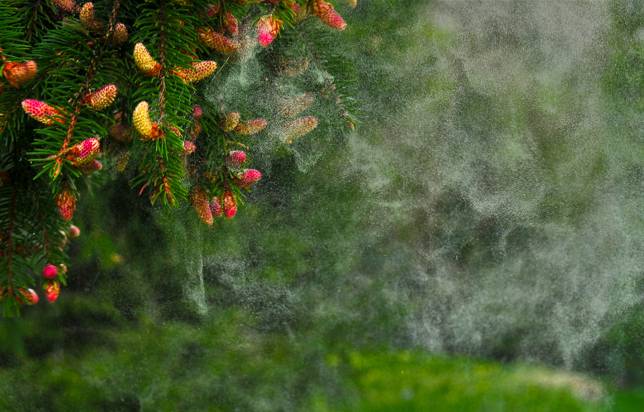The misery of allergies plus having to find the time, energy and money to get allergy medication can really take a toll on a person’s quality of life. This is especially true for those whose seasonal allergies seem to run all year long.
A simplified explanation of allergies is that they are an overreaction to substances in your environment (pollen, dander, dust, etc.) that your body feels are a threat and as a result releases histamine. Histamine is a compound released by the body in response to allergic reactions, inflammation and injury. Its job is to get white blood cells to the site of injury or issue to address and heal the problem.
The issue with allergies is that the body things something benign or even beneficial is a threat and releases a lot of histamine. The body assumes these things are pathogens (harmful microscopic organisms) and goes all out to destroy them. Your body’s misguided attempts to take out the allergens results in itchy, watery eyes, sneezing, couching, itching, hives and even swelling of the throat.
Environmental allergens, both indoor and outdoor, include, but are not limited to mildew, mold, dust mites, pet dander, grass, trees, plant pollen, food allergies, scented detergents, soaps and lotions. These “inhalant allergies” can cause a host of mental issues on top of the physical issues commonly associated with allergy. These effects can include inability/severe difficulty to focus, irritability and even depression.
There’s hope. There are a lot of lifestyle and nutritional changes you can make the significantly ease and decrease your allergy woes. Interestingly these solutions are also great for healthy skin, heart health and your waistline.
Delicious Ways Nutrition Can Help
Magnesium Rich Foods
Studies have shown that there is a connection between low magnesium and severity of allergies. Animal studies have shown that low levels of magnesium are associated with increased levels of histamine and that supplementation of magnesium can relax the smooth muscles of the tracheal. This shows magnesium’s duel purposes in allergies: lowering histamine levels and relaxing the muscles associated with respiratory system.
Many Americans are deficient in magnesium because magnesium rich foods – seeds, nuts and beans – are not common in our diet. Pumpkin seeds happen to be the most concentrated source of magnesium offering 50% of the RDA in a ¼ cup serving. Beans are incredible sources of magnesium, but many people avoid beans because they cause gas. Rinsing beans in a strainer until all the bubbles are gone is a great way to reduce or eliminate that issue. Regularly consuming magnesium rich foods can decrease allergy symptoms, as well as provide several other health benefits as this nutrient is involved in over 300 processes in the human body.
Omega 3 Fatty Acids
Another soothing nutrient is omega 3 fatty acids, or more specifically eicosapentaenoic acid (EPA) and docosahexaenoic acid (DHA). Omega 3 fatty acids have been praised for their anti-inflammatory benefits, as well as a host of other health benefits. The anti-inflammatory property is key in relation to allergies because this not only soothes tissues irritated from bouts of allergies, but also prevents the tissues from getting severe irritated in the first place.
Consuming foods rich in omega 3 fatty acids, such as seeds, nuts, certain oils, but specifically fatty fish, can be beneficial to allergy sufferers. Because EPA and DHA are both specifically found in non-plant food sources, it’s best to get them from fatty fish like salmon or to take a fish oil supplement.
Vitamin D
Vitamin D is needed for over 200 functions in the human body, many of which overlap with magnesium because vitamin D is needed for the absorption and utilization of magnesium. Vitamin D is a fat soluble vitamin, meaning it needs fat to be absorbed into the body. Omega 3 fatty acids maximize the absorption and utilization of vitamin D. This makes vitamin D, magnesium and omega 3 fatty acids a powerful health trio.
When it comes to vitamin D, studies have shown that it significantly improves symptoms of allergies. The catch is that vitamin D is the sunshine vitamin and we’re weary of the sun because of the potential of developing skin cancer. As little as 20 minutes a day of sunshine during the warm months, while wearing normal clothing, exposing some, but not all skin, provides 10,000 to 20,000 IU of vitamin D.
That said, vitamin D deficiency is common during winter months, but also in individuals who spend a lot of time indoors, avoid the sun, have high stress levels, take certain medications, carry extra weight and have darker skin because melanin is nature’s sun block. Allergic responses are going to increase the need for vitamin D as well. Supplementation of vitamin D may be beneficial in fighting allergies, as well as small sunshine breaks during warm months of the year, at times of day when pollen count is the lowest of course.
Vitamin C
Vitamin C has been shown to reduce histamine release, as well as breakdown histamine once it has been released. Regularly consuming vitamin C rich foods such as strawberries, citrus fruits, bell peppers, papaya, Brussels sprouts and cauliflower can help with seasonal allergies.
Bioflavonoids
Bioflavonoids are compounds found in foods such as citrus fruits, cherries, dark grapes, broccoli, peppers and certain teas (especially green and oolong). These compounds are closely related to vitamin C and may help cut down on histamine production by stabilizing mast cells that make histamine.
Raw, Local, Unfiltered Honey
Honey’s long list of health benefits have been touting for centuries and these days science backs up those claims. Raw, local, unfiltered honey helps with allergies, but perhaps not in the way most people think. Common ideology is that because honey is made out of pollen, consuming it will help build an immunity to the pollen you’re allergic to. It’s said to get as local as possible and even seasonal to build up immunity to correct pollens. People swear by it, but the scientific jury is still out. Science has proven that honey has incredible antimicrobial and antiviral properties, as wells as it soothes the throat. This may lend to its ability to soothe and ease allergies.
Apple Cider Vinegar
Apple cider vinegar (ACV) is enjoying a popularity hay-day because of its multitude of reported health benefits. One of those health benefits may come in handy when fighting hay fever, amongst other seasonal and inhaled allergies. ACV’s potassium thins mucus and thus helps break up congestion and alleviate nasal drainage that irritates the throat. The key is to get raw, unfiltered, unpasteurized and with the mother ACV. Sounds complicated, but that means unprocessed ACV.
Cut Back on Pro-Inflammatory Foods
If it causes inflammation, it’s going to make the signs and symptoms of allergies far worse. The biggest culprits are going to be mega pro-inflammatory sugar, salt and saturated fats. It looks like sugar is proving to be the ultimate villain to our health and this is the case with allergies as well. With the exception of 1 tablespoon of raw, local, unfiltered honey a day, eliminating all other added sugar from your diet may be the best thing you do for your allergies and overall health.
Another pro-inflammatory food on everyone’s hit list at the moment is wheat. Typically we think of the signs and symptoms of wheat sensitivity or allergy as being digestive issues. But wheat issues can present exactly like allergies with sore throat, itchy eyes, congestion and coughing.
Other Treatments and Lifestyle Factors That Can Help
Acupuncture
Acupuncture is the insertion of very thin needles just below the skin to certain spots on the body to treat a condition. Recently more and more studies are coming to light showing that acupuncture can help with seasonal allergies. You can expect roughly 6 to 12 weeks of sessions depending on allergy severity, responsiveness to treatment, other health conditions (especially stress and inflammation), and nutritional status. Seek out a quality practitioner in your area using at www.nccaom.org. Also, some insurances help with the cost.
Get Houseplants That Reduce Allergens
If you suffer from seasonal allergies, it’s easy to get fearful of plants and assume that they all are going to make your allergies worse. That is not the case. Houseplants offer a variety of health benefits and some have been found to purify the air of the very allergens that make you miserable.
Get Rid of Scented Candles, Lotions, Soaps and Laundry Detergent
The chemicals in artificially scented household products can send your hormones and allergies all over the place. Swap them out for unscented products as soon as possible. If you still want to enjoy the nice scent of candles, soaps and fresh laundry, use essential oils. In fact, swapping out chemicals for essential oils can have health benefits as some essential oils ease allergies.
Sleep, Get Some
Sleep is the time for the body to repair from the day and prepare for the day ahead. It’s the time our body heals and it’s an absolute must to keep our minds, hormones, digestive tract and overall immune system in check. Sleep deprivation is only going to make the signs and symptoms of your allergies worse.
All this may seem like a lot to take in and even harder to implement. But if you step back and look at it, it’s not. Essentially what you’re doing is making healthy life choices. Every single one of these suggestions can be lumped under a healthy diet and lifestyle. Less sugar, salt and chemicals. More fruits, vegetables, water, local foods, healthy bacteria, vitamin D and sleep. All of which are choices that are not only great for relieving seasonal allergies, but for mental health, heart health, your waistline and your skin.
Sheila Amir is the owner, author and Sheila of NutritionSheila.com, a website dedicated to bring you health, wellness and nutrition information you can actually use. Get free health information and recipes delivered to you by clicking HERE.


 RSS Feed
RSS Feed